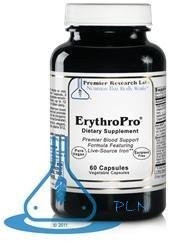The most common form of anaemia is iron deficiency anaemia. Women are particularly susceptible to iron deficiency due to the regular loss of iron rich blood during menstruation. Iron deficiency is believed to be a relatively common precursor to female hair loss, in fact, 72% of women with hair loss have an iron deficiency.
Symptoms: Rapid hair loss, weight loss, pale appearance, spoon shaped nails, depression, change of hair color to a lighter shade, excessive dryness of hair.
There are many reasons that women Anaemia is commonly caused by a lack of iron, which is one of the most important minerals for your hair. Iron also optimizes energy levels, nourishes your skin and keeps your heart healthy - an all-round essential for your general fitness and well-being.
IRON DEFICIENCY ANAEMIA
Iron deficiency anaemia is caused by low numbers of red blood cells (haemoglobin). It usually occurs if your diet lacks iron-rich foods, or you aren’t absorbing it correctly. However, loss of blood, illness and pregnancy can also be causes of anaemia. A large proportion of women who come into our trichological clinics for hair loss treatment have some degree of anaemia.
THE BEST DIETARY SOURCES OF IRON ARE RED MEATS
If you’re losing your hair, or notice it isn’t growing at the rate or to the length it used to, we suggest you have your doctor test your iron levels, as both of these can be symptoms of anaemia. Iron levels should be  analysed by checking the following blood levels.
analysed by checking the following blood levels.
It’s important to follow the dosage, as high iron levels can also be dangerous and taking more than prescribed will not lead to a faster result. You may also want to ask your doctor to suggest changes to your diet. The most beneficial treatment for anaemia is when you receive iron both through good nutrition and the correct supplement.
FERRITIN: STORED IRON
Ferritin is a stored iron that helps to produce hair cell protein. It’s found in every cell in your body and is essential for healthy hair.
WHY IS FERRITIN IMPORTANT?
Ferritin is stored iron, so first and foremost good levels are important in the prevention of anaemia. Correct ferritin levels also maximize your hair’s ‘anagen’ or ‘growing’ phase and encourage your hairs to grow to their full length. When you aren’t getting enough iron through your diet, your body takes ferritin stored in non-essential tissue, like your hair bulb, and gives it to essential tissue, such as your heart.
Because your hair bulb is where all your hair cells are produced, this leeching of ferritin can cause your hair to shed before it reaches its maximum length. This can even occur if your haemoglobin level is normal. Ferritin can also be too high, and cause a condition known as haemocromatosis, where your body produces excess iron which can affect your liver and heart.
TESTING FERRITIN LEVELS
Ferritin levels are not always tested, even when your iron levels are tested. If you notice excessive hair loss, ask your doctor to check them. However, it’s important to note that optimum ferritin levels for your hair are higher than those considered acceptable for your body. Again, this is down to your hair being a non-essential tissue.
At Kasia Organic Salon we often recommend taking ErythroPro by Premier Research Labs.
ErythroPro Key Benefits:
- Highly bio-available, natural-source iron; does not promote free radical production such as inorganic (rock) forms of iron (i.e. ferrous Fumarate).
- Designed to help rapidly restore iron levels and support overall mineral metabolism.
- Provides key blood factors; elegant natural sources of folic acid, vitamin B12, copper, iodine and more.

- Natural-source iron does not accelerate aging in the brain or the neurological system (ferrous fumarate and other non-living source forms of iron can stress immunity, cause constipation and are difficult to absorb)
- Can be used in pregnancy without creating an upset stomach, nausea or morning sickness
It can take as long as 6 months to increase ferritin levels, but don’t despair or become impatient. As your levels improve, your hair will benefit immensely.
FOODS RICH IN IRON
- Red meat
- Liver
- Kidneys
- Lentils
- Spinach
- Raw peaches
- Prunes
- Prune juice
- Raw or dried apricots
- Broccoli tops
- Potato skins
- Almonds
- Walnuts
- Parsley
- Treacle (molasses)
- Beetroot
Reference Article : Phillip Kinglsey


